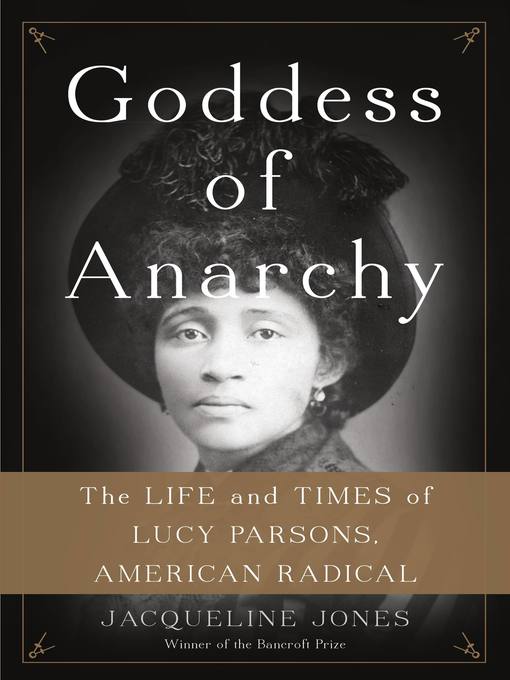
Goddess of Anarchy
The Life and Times of Lucy Parsons, American Radical
کتاب های مرتبط
- اطلاعات
- نقد و بررسی
- دیدگاه کاربران
نقد و بررسی

October 2, 2017
In the first biography in more than 40 years of radical labor agitator Lucy Parsons, Jones (A Dreadful Deceit), Bancroft Prize–winning chair in history and ideas at the University of Texas at Austin, lucidly portrays a fiery, outspoken woman whose life holds significant lessons about the past and future of labor in America. Parsons wrote and spoke on issues that remain urgent in the 21st century: the punishing wealth disparity between workers and bosses, organizing amid police brutality, and the impotence of the two-party system. Both Parsons and her husband, Albert, called for armed struggle, believing it would act as the catalyst to destroy the capitalist machine. After a bomb exploded at Chicago’s Haymarket Square in 1886, Albert was hanged for his inciting rhetoric. Jones uncovers new aspects of Parsons’s story, such as her birth to an enslaved woman in Virginia, which she disguised with tales of Spanish-indigenous origins. Jones also casts a critical eye on the dissonant aspects of Parsons’s life and politics, such as her refusal to engage with black-working-class struggles and her distaste for doctrines of free love propagated by fellow anarchists (notwithstanding the widow Parsons’s own public affair with a married man). Despite some dry prose, Jones impresses with this richly detailed and empathic study of a complex figure. Illus. Agent: Geri Thoma, Writers House.

October 15, 2017
Tough-minded biography of a fiery revolutionary whose activism spanned the decades from Reconstruction to the New Deal. Bancroft Prize winner Jones (Chair, History and Ideas/Univ. of Texas; A Dreadful Deceit: The Myth of Race from the Colonial Era to Obama's America, 2013, etc.) evinces considerable respect for her subject, a woman born into slavery who gained fame in 1880s Chicago as one of the anarchist movement's most vocal advocates of violent revolt. But the author finds plenty to criticize about Lucy Parsons (1853-1942), beginning with her decision, when she left Texas with her white husband, Albert, to disguise her racial identity and to almost entirely ignore the plight of African-Americans as she battled for the working class. Jones deplores the couple's praise of "the dear stuff dynamite" as an instrument of liberation--loose talk that helped convict Albert and seven other anarchists of conspiracy to murder in the wake of an 1886 demonstration in Chicago's Haymarket Square even though none of them threw the dynamite that killed seven policemen. The biographer's sympathies are clearly with more pragmatic radicals like Mother Jones, who argued that the anarchists' theatrical tactics and rhetoric were distractions in the struggle for real reforms like the eight-hour working day. Jones also finds distasteful Lucy's embrace of traditional gender roles, promoting herself as the widow of a Haymarket martyr and plugging her self-published copies of Albert's biography at every opportunity while leading a sexually free life and railroading her son into an insane asylum after a quarrel. Nonetheless, the author acknowledges Lucy's gifts as an orator and salutes her refusal to be relegated to a subordinate role by her male comrades. "In the end," she concludes, "there are few lives that are not a bundle of contradictions and shortcomings." Parsons remained committed to radical causes throughout her long life and gave her last speech, to a group of striking workers, scarcely a year before her death in 1942. Comprehensive and fair, though a little more warmth toward Parsons would have made the book more engaging.
COPYRIGHT(2017) Kirkus Reviews, ALL RIGHTS RESERVED.

November 15, 2017
Jones (women's history, Southern History, Univ. of Texas at Austin; Labor of Love, Labor of Sorrow) explores the life of Lucy Parsons (1853-1942), an advocate of anarchism and labor rights. Born into slavery in Texas before the Civil War, Parsons first achieved notoriety when her husband, Albert Parsons, was hanged for his involvement in the 1886 Haymarket Affair. Jones is at her best when describing the burgeoning city of Chicago, where the couple moved in the early 1870s. Parsons became a propagandist; speaking, writing, and publishing on behalf of various social issues, including the right to free speech and justice for workers. In the early 20th century, Parsons allied herself with the militant unionism of the International Workers of the World, which rejected negotiation or political solutions and organized mass labor protests. In her role as organizer and speaker, Parsons associated with some of the major figures of her time. Jones's book persuasively explains both the causes for which Parsons fought as well as inconsistencies apparent in her character and actions. VERDICT This readable biography will appeal to readers with many interests, including the history of women's studies, radicalism, labor, race relations, urbanism, and especially Chicago.--Charles K. Piehl, Minnesota State Univ., Mankato
Copyright 2017 Library Journal, LLC Used with permission.

November 15, 2017
Bancroft Prize-winning historian Jones (A Dreadful Deceit: The Myth of Race from the Colonial Era to Obama's America, 2013) has crafted an outstanding book about the life of a little-known American woman orator: Lucy Parsons. Jones tells the story of Lucia Carter, born to an enslaved African woman in Virginia in 1851, who comes of age and chooses a different name, Lucy, and a different identity, declaring herself to be Mexican and Native American. Her family moved to Texas after the Civil War, and that's where she met and married a white, former confederate soldier named Albert Parsons. The couple moved to Chicago and became agitators for different causes, from republicanism to socialism to anarchy. Albert was convicted for his role in the Haymarket Riots, in 1886, while Lucy emerged as an accomplished writer and traveling orator. She worked hard to raise money for Albert's legal appeal but was unable to win his release from prison, where he was hanged. Jones' fascinating portrait presents an enigmatic, unpredictable activist who sustained a lifelong oratory and writing career.(Reprinted with permission of Booklist, copyright 2017, American Library Association.)

























دیدگاه کاربران